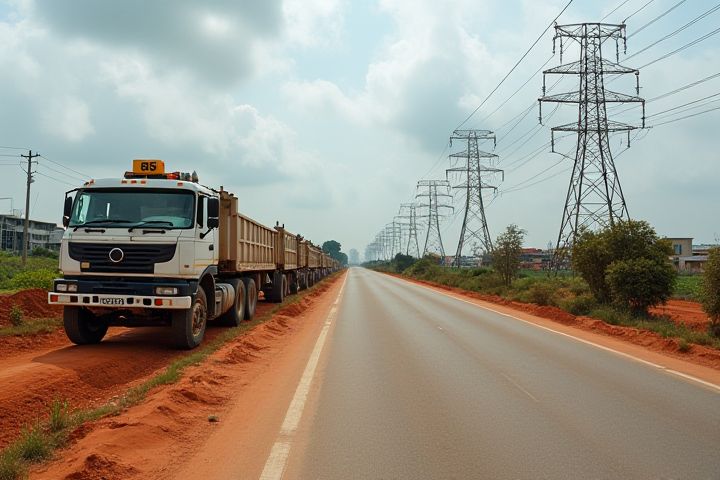
Nigeria's infrastructure, comprising transportation, energy, and telecommunications systems, is pivotal for economic growth and development. The country has significant road networks, with over 200,000 kilometers of asphalt-paved roads facilitating trade and mobility. Rail transport is evolving, with ongoing projects aimed at revitalizing the national rail system, enhancing connectivity between major cities. Power generation remains a critical challenge, with initiatives to increase capacity and diversify energy sources through renewable projects like solar and hydroelectric plants. Modern telecommunications infrastructure is rapidly advancing, providing internet and mobile services to millions of Nigerians, essential for fostering innovation and improving quality of life.
Power supply challenges
Nigerian infrastructure faces significant power supply challenges, with frequent outages hindering industrial growth and adversely affecting daily life. The country relies heavily on a mix of hydroelectric plants, gas-fired power stations, and renewable energy sources, yet the total generation capacity falls short of demand. Investments in modernizing the grid and expanding off-grid solutions are crucial to improve reliability and access to electricity. By addressing these power supply issues, Nigeria can foster economic development, enhance quality of life, and attract foreign investment.
Road network development
Nigerian infrastructure emphasizes the expansion and enhancement of road networks to support economic growth and improve connectivity. Major projects, such as the Lagos-Ibadan Expressway and the East-West Road, aim to reduce travel time and boost trade efficiency across regions. Investments in modern highway systems are crucial for facilitating access to remote areas and stimulating local economies. As you navigate these roads, your experience will reflect the government's commitment to developing resilient and sustainable infrastructure.
Railway expansion projects
Nigerian infrastructure is undergoing significant transformation through extensive railway expansion projects aimed at improving connectivity and economic growth. The government prioritizes the development of a modern rail network that connects major cities, facilitating the efficient movement of goods and passengers. Partnerships with foreign investors and engineering firms are fostering the transfer of technology, ensuring that these projects are not only ambitious but also sustainable. You can expect enhanced trade opportunities and reduced transit times as these railway initiatives progress, reshaping the landscape of transportation in Nigeria.
Port congestion issues
Port congestion in Nigeria significantly affects trade efficiency and economic growth, as cargo delays lead to increased shipping costs and reduced competitiveness. This issue arises from inadequate infrastructure, including insufficient road and rail connectivity to major ports such as Apapa and Tin Can Island in Lagos. The Nigerian government, recognizing the urgency, is investing in modernization projects and technological solutions to streamline operations and enhance capacity. As you navigate this landscape, understanding these challenges can aid in making informed logistics decisions.
Telecommunications growth
Nigeria's telecommunications sector has experienced rapid growth, becoming one of the largest in Africa. With a significant increase in mobile phone penetration, currently exceeding 180 million subscribers, the industry has transformed communication and access to information. Key players like MTN, Airtel, and Glo invest heavily in infrastructure, expanding coverage and enhancing broadband services across urban and rural areas. Government initiatives, such as the National Broadband Plan, aim to improve internet access and support digital innovation, fostering economic development and connectivity for citizens.
Water supply inefficiencies
Nigerian infrastructure faces significant challenges related to water supply inefficiencies, impacting both urban and rural communities. Inadequate investment in water treatment facilities and distribution networks leads to recurrent shortages and contamination, affecting public health and economic productivity. You may encounter areas where reliance on boreholes and private wells increases, as the public water system struggles to meet demands. This situation necessitates a comprehensive strategy to enhance water management, improve infrastructure, and ensure sustainable access to clean water for all citizens.
Internet penetration rates
Nigeria has witnessed significant growth in internet penetration rates, driven by increased investments in telecommunications infrastructure and mobile technology. As of October 2023, approximately 50% of the population has access to the internet, primarily through mobile devices, which have become crucial in bridging the digital divide. Various government initiatives and private sector partnerships are aimed at expanding broadband access to underserved regions, enhancing digital literacy, and fostering economic development. This focus on internet accessibility not only connects individuals but also promotes e-commerce, education, and innovation across the country.
Urbanization pressures
Nigerian infrastructure is increasingly challenged by rapid urbanization, with cities like Lagos experiencing significant population growth that strains transport networks, housing, and sanitation systems. The government's efforts to address these issues include investments in road expansion, mass transit systems, and affordable housing projects, aiming to enhance urban livability. As urban centers continue to expand, the demand for integrated infrastructure solutions becomes critical for sustainable development. Your understanding of these dynamics can highlight the importance of strategic planning in mitigating urbanization's impact on Nigeria's economy and quality of life.
Public-private partnerships
Nigerian infrastructure development increasingly emphasizes public-private partnerships (PPPs) as a strategic approach to address funding gaps and enhance service delivery. These collaborations leverage private sector investment and expertise to improve transportation, energy, and healthcare systems across the nation. Successful PPP projects, such as the Lekki Toll Road and numerous power initiatives, demonstrate the potential for increased efficiency and innovation in service provision. As you explore investment opportunities, understanding the legal frameworks and incentives for PPPs in Nigeria can enhance your strategic planning and risk management.
Infrastructure funding gaps
Nigerian infrastructure urgently requires addressing significant funding gaps to support its economic growth and development aspirations. The country's roads, railways, and energy sectors suffer from inadequate investment, which hinders business operations and affects the quality of life for citizens. Strategic partnerships with private investors and international financial institutions are essential for mobilizing the necessary capital to enhance infrastructure resilience. Focusing on sustainable funding models can stimulate improvements in transportation, power generation, and urban development, leading to long-term economic benefits for Nigeria.
